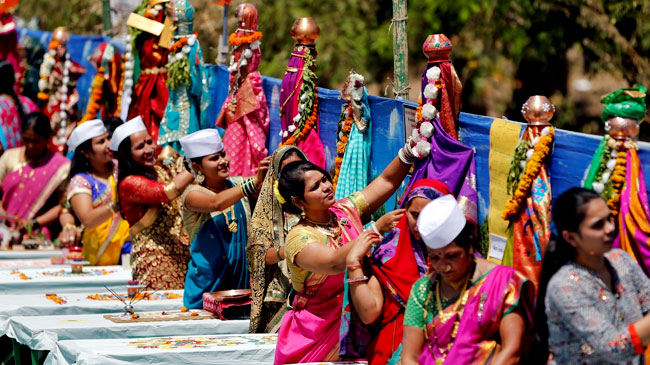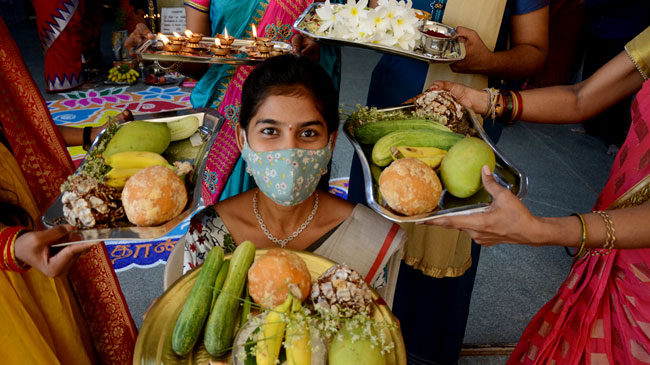For those who live in the Deccan region of the Indian subcontinent, Ugadi is a well-known holiday. In the southern states of Andhra Pradesh, Karnataka, and Telangana, the new year is heralded by a nine-day carnival. According to Hindu mythology, the beginning of each year commemorates Lord Brahma's creation of the cosmos. The people of Andhra Pradesh and Telugu worldwide celebrate Ugadi as the New Year. The first day of the new month, Chaitra, of a new year, according to the Hindu calendar, is seen as auspicious. On this day, according to popular belief, Lord Brahma began to create the components that make up the earth. Karnataka and other South Indian states take great pleasure and passion in celebrating the holy festival of Ugadi. The Hindu lunisolar calendar observes Ugadi on the first day of Chaitra. The syllables "Yuga'' and "Adi," which mean "a new beginning," are the source of the name "Ugadi." Ugadi is thought to have been the first day the universe was created. According to Hindu mythology, Lord Brahma first created the days, the weeks, the months, and the years on this day.
Preparation Of The Ugadi Festival
The festival's planning starts roughly a week in advance. People tidy their homes and buy new outfits and presents for their loved ones. There is a lot of enthusiasm as Ugadi is being prepared. The youngsters celebrate because they wear new clothes and receive gifts from the adults. The kids all take turns helping to decorate their homes with rangolis and mango leaves.
Rituals Of The Ugadi Festival
People observe several ceremonies on Ugadi day. They take a bath in the morning before going to the temple. People recite mantras to ask God for his blessings so they can have a prosperous and happy year. The Ugadi day is considered an auspicious day to begin any new endeavours, including businesses, home purchases, and automobile purchases. On this day, individuals perform ceremonial worship to bless the New Year. People pray for happiness, health, and success in their daily lives.
Celebration Of Ugadi Festival
The holiday of Ugadi includes several ceremonies and traditions. Karnataka and Andhra Pradesh residents celebrate their New Year on this day with a lot of zeal and devotion. Social gatherings, an important component of the celebration, may be found throughout the day, full of joy and happiness. People ask God for success and joy in their lives. People believe that if you do new activities on this day, you will succeed because it is such a sacred day. Both religious spirits and general good times distinguish the festivity. Ugadi, a colourful holiday, is observed to ring in the New Year with plenty, pleasure, and success. The festival is special for the area as it ushers in the spring season and the start of nature's annual cycle. In anticipation of a bumper crop, the farming families prepare for the new year. Ugadi is also regarded as a holy period for starting new endeavours. The day-long celebrations are typically prepared a few days in advance. People from various social classes begin the day by taking an oil bath and dressing in brand-new traditional attire. After cleaning their home, they pray and make offerings.
The entire family prays for a fruitful year and worships the Panchanga. On this holy day, the Indra Dhwaja is also revered. Devotees from across the state observe the day by attending religious and cultural events and cooking lavish feasts for their loved ones. A unique treat called Bevu Bella perfectly encapsulates the spirit of this holy day. Different components are mixed, including tamarind, neem leaves, jaggery, raw mango, pepper, and salt. The meal represents a variety of human emotions and portends a year full of bittersweet life events. Another important aspect of this holy occasion is the red soil and lovely string of mango and neem leaves used to decorate the front door. People also create vibrant designs in front of their homes, known as Kolamulus or Rangoli, using rice and flowers. The Ugadi holiday, celebrated for its spiritual significance and vibrant cultural offerings, fills people's lives with hues of happiness, hope, and prosperity.
Delicacies Of Ugadi Festivall
Ugadi, a vibrant festival that marks the beginning of the New Year in some parts of India, is a time for festivity and indulging in various scrumptious dishes. Pachhadi, a unique chutney that combines six different flavours and spices, including delicate neem blossoms, red chilli powder, tangy tamarind pulp, raw mango, jaggery, and salt, is an essential item on the menu. Holige or Obattu, a sweet flatbread stuffed with lentil and jaggery, and Puliogare, a tangy and spicy tamarind rice, are some of the other delicacies served on this day. Desserts form an integral part of any celebration in India, and Ugadi is no exception. Mouth-watering sweets like payasam, a rice pudding; Obbattu, a jaggery-based confection; and Boorelu, made from Bengal gram, jaggery, and coconut, are prepared and relished across the country. Other popular desserts include Aval Payasam, Semiya Payasam, and Mysore Paak. So, try out these delightful treats during the festive season.
Significance Of Ugadi Festival
Ugadi represents or instructs us to let go of the past and positively welcome a new beginning in life. Ugádi is a joyous holiday for prosperity, pleasure, and peace. One of the most important festivals in Karnataka is Ugadi, which features customary customs, colourful displays, and genuine savoury foods. Discover Karnataka's vibrant culture in its splendour during the Ugádi celebrations.
How Is The Ugadi Day Observed
The day is commemorated by painting vibrant designs called Muggulu on the floor, hanging Toran—mango leaf decorations—on doorways, purchasing and giving gifts like new clothing, helping the needy, providing oil massages and special baths, making and distributing pachadi, and visiting Hindu temples. A popular festive dish, pachadi mixes all flavours, including sweet, sour, salty, bitter, astringent, and piquant. Hindu traditions in Telugu and Kannada use it as a warning to expect all kinds of experiences in the next new year and make the most of them.
History Of Ugadi Festival
Ugadi is an auspicious occasion for Hindus and holds great historical significance. According to records, the wealthy and the middle class donate to temples on this day. According to tradition, Lord Brahma commenced the creation of the universe on Ugadi, introducing time measurements like years, months, weeks, and days. As a result, the day marks the start of a new era. Hindu literature refers to Lord Vishnu, known as Yugaadikrit, as the creator of ages or yugas. Telugu and Kannadiga people pray to Lord Vishnu for his blessings, seeking happiness, prosperity, and success in their lives. Additionally, Maharishi Vedavyasa describes the beginning of this new era as the Yesmin Krishno Divamvyataha, Tasmat Eeva Pratipannam Kaliyugam. Furthermore, Lord Krishna passed away on the day of Ugadi, adding more significance to this joyous occasion.
Major Attractions Of The Ugadi Festival
The renowned holiday of Ugadi, which marks the start of the new era, is primarily observed in the southern Indian regions. This celebration has numerous ceremonies and traditions attached to it. Here are a few of Ugadi's main draws. People have several reasons to celebrate the new year during this well-known Indian holiday.
- House Decoration
- Visiting temples
- Making of Ugadi Chutney
- Rangoli making






